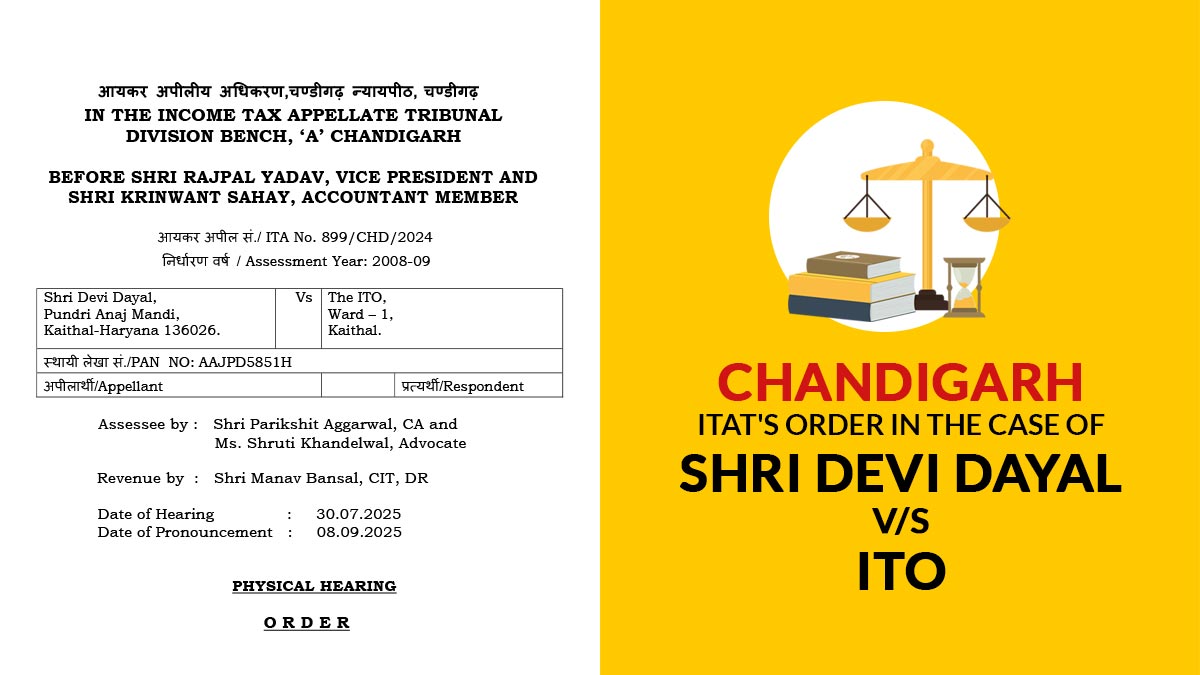
The Income Tax Appellate Tribunal (ITAT) in Chandigarh has recently excused a 38-day delay in filing an appeal, determining that an appellant’s explanation of an order being directed to his email’s spam folder constituted “sufficient cause” under Section 253(5) of the Income Tax Act, 1961.
The case involved Devi Dayal, a resident of Kaithal, Haryana, who had initially filed his income tax return for the Assessment Year 2008-09, declaring an income of ₹2,70,600. Following reassessment proceedings, additions were made to his taxable income.
Dayal’s initial appeal to the Commissioner of Income Tax (Appeals) was dismissed. The crucial appellate order, dated May 18, 2024, was sent electronically but inadvertently landed in his email’s spam folder. He only became aware of the order after a routine check of pending matters, leading to a 38-day delay in filing his subsequent appeal with the ITAT.
Represented by advocates Parikshit Aggarwal and Shruti Khandelwal, Dayal argued that the delay was unintentional and beyond his control, emphasising that he had no knowledge of the order until its accidental discovery. It was further contended that the appeal was genuine, with no deliberate intent to gain an advantage through late tax filing.
Conversely, the Revenue, represented by Manav Bansal, argued that taxpayers are expected to be diligent in income tax matters and cannot avoid responsibility by citing technological glitches or oversight.
The ITAT Bench, comprising Vice President Rajpal Yadav and Accountant Member Krinwant Sahay, thoroughly examined Section 253(5) of the Income Tax Act, 1961. This section grants the tribunal the authority to accept appeals beyond the stipulated period if a “sufficient cause” for the delay is established.
Read Also: Hyderabad ITAT Waives Section 234E Late Fees for Delayed Quarterly TDS Filings
The tribunal also referenced Section 249(3) of the Act and Section 5 of the Limitation Act, 1963, both of which utilise the term “sufficient cause.”
Furthermore, the Bench cited Supreme Court judgments in Collector Land Acquisition v. Mst. Katiji (1987) and N. Balakrishnan v. M. Krishnamurthy (1998), which underscore that limitation laws aim to prevent abuse of legal processes rather than penalise genuine litigants.
The ITAT relied on Dayal’s application for condonation of delay, which detailed the email misplacement, and supported its decision with Supreme Court precedents that interpret “sufficient cause” broadly.
The Tribunal concluded that Dayal stood to gain nothing by delaying the appeal, as the consequence would have been a significant tax liability. They observed that the delay was neither intentional nor a strategic attempt to prolong litigation with the Revenue. Consequently, the ITAT decided to condone the delay in filing the appeal.
| Case Title | Shri Devi Dayal vs. ITO |
| Case No. | ITA No. 899/CHD/2024 |
| Assessee by | Shri Parikshit Aggarwal, Ms Shruti Khandelwal |
| Revenue by | Shri Manav Bans |
| Chandigarh ITAT | Read Order |